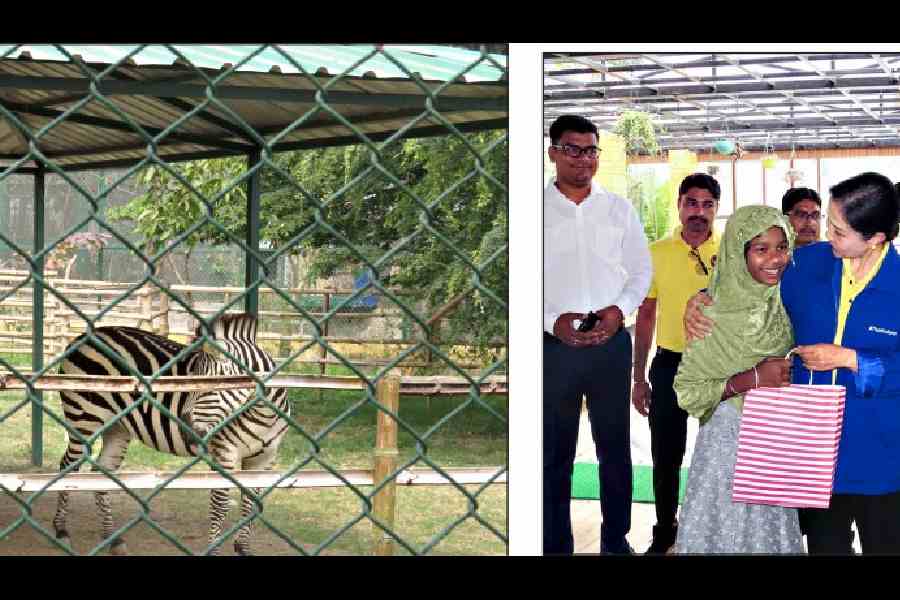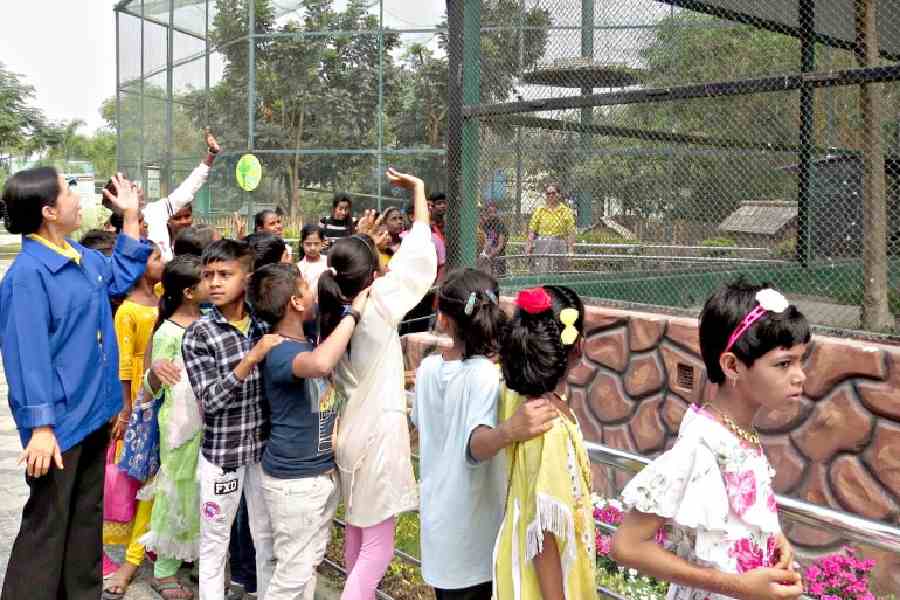Look, that monkey is grinning at you! You two are one of a kind. So he thinks you are a family member,” a teenager pulled his friend’s leg, pointing at a primate inside the cage. The friend made a face at him in response.
A younger member of the group was awestruck on seeing a giraffe. “How tall was he as a baby?” she asked the accompanying teacher.
Such comments flew thick and fast as 42 children from Tiljala Shed, an organisation that works to empower ragpicker communities, took a tour of Harinalaya, the mini zoo at New Town. The trip had been organised by the royal consulate general of Thailand and supported by BLS International, a visa processing company.
The first cage they walked by was of blue and yellow macaw. The colourful birds were then busy having breakfast. “We give them sprouting sunflower seeds, grams and green grams. Their favourite but is walnut. Seasonal fruits are hung inside their cage so that they pick at them as they do in the wild,” said a guide who was showing them around.
The children heard in amazement that the equally colourful lory birds insert their long beaks inside fruits and suck in the pulp. “That’s because they cannot eat solid food. Everything has to be served to them in liquid form,” the guide said.

(l-r) A zebra couple at Harinalaya, Thai consul general Siriporn Tantipanyathep hands over gifts to a child from Tiljala Shed
The hippopotamus was found lazing in a waterbody, with just its eyes and nostrils visible. “They swim around the periphery after they finish their meal in the afternoon and graze when it gets cooler,” the guide said, adding that they would be found in the water in summer and overland when it is cold.
It was also pointed out to the children how equipment like swings have been provided in their enclosures so they get exercise.
The mini zoo has five types of primates including capuchins, tamarins, marmosets and hullock gibbons. The latter were rescued and sent here. “The primates are intelligent. We challenge them by hiding their favourite snack, mealworms, in wooden boxes. You have to see how they work their way through the puzzle to get the snack,” the guide said.
The consul general of Thailand, Siriporn Tantipanyathep, struck up quite a rapport with the children, doing high fives and posing for selfies with many of them. The consulate staffers were all wearing yellow. “In Thai culture, it is the colour of Monday, on which our king was born,” she explained.
At the end of the trip, the children sat down for lunch at the zoo cafeteria. Fourteen-year-olds from Tangra, Arushi Viswaparna and Sangita Sharma, were bubbling with excitement. “We had so much fun. The hippo was our favourite,” Arushi said.
Md. Shafkat Alam, joint secretary of Tiljala Shed, explained how his organisation rescue children from the rag-picking profession and enrol them in educational centres and help them procure official documents.
“These children stay in shanties next to Topsia canal through which the city’s sewage flows. We have enrolled them in government schools and they come to the Shed to spend four hours a day in joyful learning,” he elaborated. He had met the deputy consul general of Thailand Piyapan Atipatya at a programme, which led to the children’s zoo visit.
“We get involved in social work like cleaning up and landscaping to improve society. It is so gratifying to see the smiles on their faces. I visited the zoo in Bangkok as a child and again when my daughter was a child. So I know what kind of joy children derive from seeing animals,” said the consul general, after handing over are turn gift to each child.
Zoo officials said Harinalaya had turned out to be a favourite destination for institutions to bring their children over. “We offer 50 per cent discount on entry fees to deserving cases,” an official said. Tickets cost Rs50 for visitors aged above five years and Rs 20 for those under five.
ZOO READIES FOR BIG CAT ADVENT
Harinalaya is awaiting the advent of big cats. A pair of tigers is expected to come from Bengal Safari in Siliguri this summer. An enclosure is being readied for a pair of lions too. The mini zoo has harnessed technology to prevent situations witnessed at Alipore zoo like a visitor jumping into the tiger’s moat or a monkey (marmoset) being stolen.
“We have sensors and AI-based cameras fitted to the boundary walls of birds and gibbons. If anyone crosses the sensor line, an alarm will go off.
The same will happen on the periphery wall after 6pm,” a zoo official said. The zoo, which was barren when it first started housing deer and thus got its name, has increased its green cover. “We have planted mostly tall trees, about 3,000-3,500 in number,” the official added.
